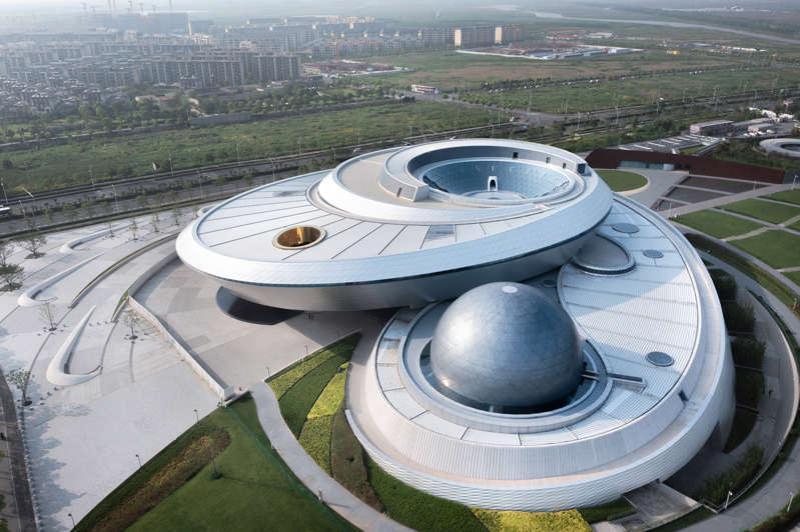The World’s Largest Astronomy Museum Opens in Shanghai
By: Lyndsey Matthews
BUZZ NOTE: There is a relevant video with this article which may be accessed by clicking on the "SEEDED CONTENT" link just below this message, which will take you to the original MSN source article.

The World’s Largest Astronomy Museum Opens in Shanghai

© Courtesy of Ennead Architects, photo by Arch-Exist The World’s Largest Astronomy Museum Opens in Shanghai
After an opening ceremony on July 17, the Shanghai Astronomy Museum officially opened to the public on July 18. Located in the Lingang area of Shanghai, the new museum is a branch of the Shanghai Science and Technology Museum, which also operates the Shanghai Natural History Museum and the Shanghai Planetarium.
At 420,000 square feet, it is the largest museum in the world dedicated to astronomy. But its size isn’t the only impressive thing about this new museum. Thomas J. Wong of Ennead Architects intentionally designed the building without straight lines or right angles—similar to the geometry of the universe. Previously known as Polshek Partnership, Ennead was also behind the Rose Center for Earth and Space at the American Museum of Natural History in New York City.
“The big idea of the Shanghai Astronomy Museum was to infuse a visceral experience of the subject matter into the design,” said Wong in a press release.
That means the three main architectural components of the building—the Oculus, Inverted Dome, and Sphere—not only act as functional elements of the design (the Sphere houses the planetarium theater, for example), but also are working astronomical instruments that track the sun, moon, and stars.

© Courtesy of Ennead Architects, photo by Arch-Exist The Oculus is above the museum’s main entrance.
The Oculus is located directly above the museum’s main entrance. As the sun passes through the opening, a circle of light tracks across the entry plaza marking the passage of time. The Oculus was specially designed so that at noon on the summer solstice, a perfect circle of light aligns with a circular platform directly underneath it.
BUZZ NOTE: The video with this article was positioned here.

© Courtesy of Ennead Architects, photo by Arch-Exist The Sphere as seen from inside the museum
The Sphere is embedded in the roof of the museum’s lower wing so half of it is submerged inside the building and appears to float weightlessly above the floor. Inside the sphere, you’ll find the planetarium theater.

© Courtesy of Ennead Architects, photo by Arch-Exist The Inverted Dome is an atrium that guests can walk on top of.
The Inverted Dome is a “large inverted glass tension structure” aka a large glass dish that acts as the atrium of the upper wing of the museum. After following a spiraling ramp underneath the Inverted Dome through the museum’s exhibits, visitors can walk out on top of it to take in the surrounding views.

© Courtesy of Ennead Architects, photo by Arch-Exist. Inside the exhibition space within the museum
Tags
Who is online
119 visitors



If I were up to travelling these days - and the super-fast trains here make travelling easy - that would be the first thing I would want to go and see.
The description, photos, and video are beyond impressive. No straight lines or right angles and designed for the cosmos. Would I love to be able to tour it.
Is the museum close to (FAST) the Five-hundred-meter Aperture Spherical Radio Telescope?
The museum is in greater Shanghai, a populated area, and FAST is located in the mountains of a wilderness area quite distant from Shanghai.
I really want to see this some day. Beautiful architecture!
Some more images of the museum...
.
.
.
.
This is a model in the new museum of the inside of the new Chinese space station.
.
.
.
.
It's a shame we don't have more science museums like the Shanghi Museum. Instead, we have fake museums like the Ark Encounter promoting ignorance over actual science.
Persieds peaking Aug 12-13th. Pretty good moon phase for a darker sky so viewing will be great if it's clear.
Find a patch of dark sky and check it out if you can. It's usually the best shower of the year.